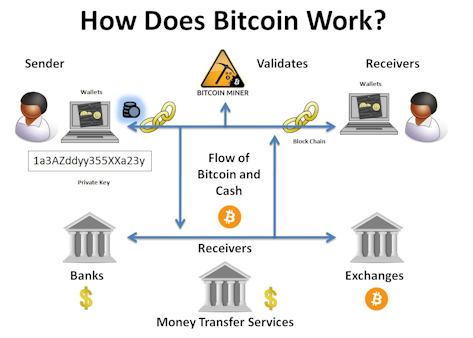HOW THE BITCOIN SYSTEM WORKS
PART (A)
Bitcoin is just a digital file/ ledger that can contain names and balances, where people exchange money by exchanging these files. For example, if Anthony buys a vacuum cleaner from Helen for 0.00003678btc , then Anthony’s balances will go down by 0.00003678btc while that of Helen will go up by 0.00003678btc.
There is no gold or government issued money backing this currency, nobody controls or manage this ledger, the goal of bitcoin is to avoid any centralized control. Everybody maintains his own copy of payment made. The bitcoin system uses account number not account name, so as to create some level of anonymity.
A QUESTION TO ASK….

Source:bitcoinsnitch.com
IF everybody maintains their own ledger, how would other ledger be kept in snyc has a transaction is being made ?. The basic of all, when you want to send money, you simply tell everyone else by broadcasting a message by your own account number and the receiver’s account number and the amount. Then everyone across the world updates their ledger.
Another quicker side , how bitcoin works for power users, people who helps maintain the system. You can also just use the system to send and receive money, without maintaining a ledger. If sending money is as simple as creating a message with someone’s account number, what then stops a thief “(DON)” from stealing Helen’s money by using Helen’s account number ?.Just like paper check, bitcoin requires a kind of signature to verify the person sending money is the real owner of the account. This signature is a combination of mathematical numbers and letters as oppose to him writing.
When a new account number is created ,it usually comes with a private key mathematically linked to that account number .G=f(p)
To create a signature, a text from the transaction with a part of the private key are joined together using a mathematical function signature creator f(q, r). Then another function allows other people to check if the signature was created by the account owner and it applies to that specific transaction. This signature can not be re-used in the future as they are unique to a specific transaction. With the possibility of the mathematical signature to prove who has sent the transaction it can’t determine what time it was sent. In a traditional banking system, for example, if Anthony issues a check of $100 each to two persons and only has a balance of $100 in his account. The bank would be able to pay who first attempt to cash with his check, rather in which to determine who get paid first, the bank should be determine what time each check was issued, which is presently not possible.